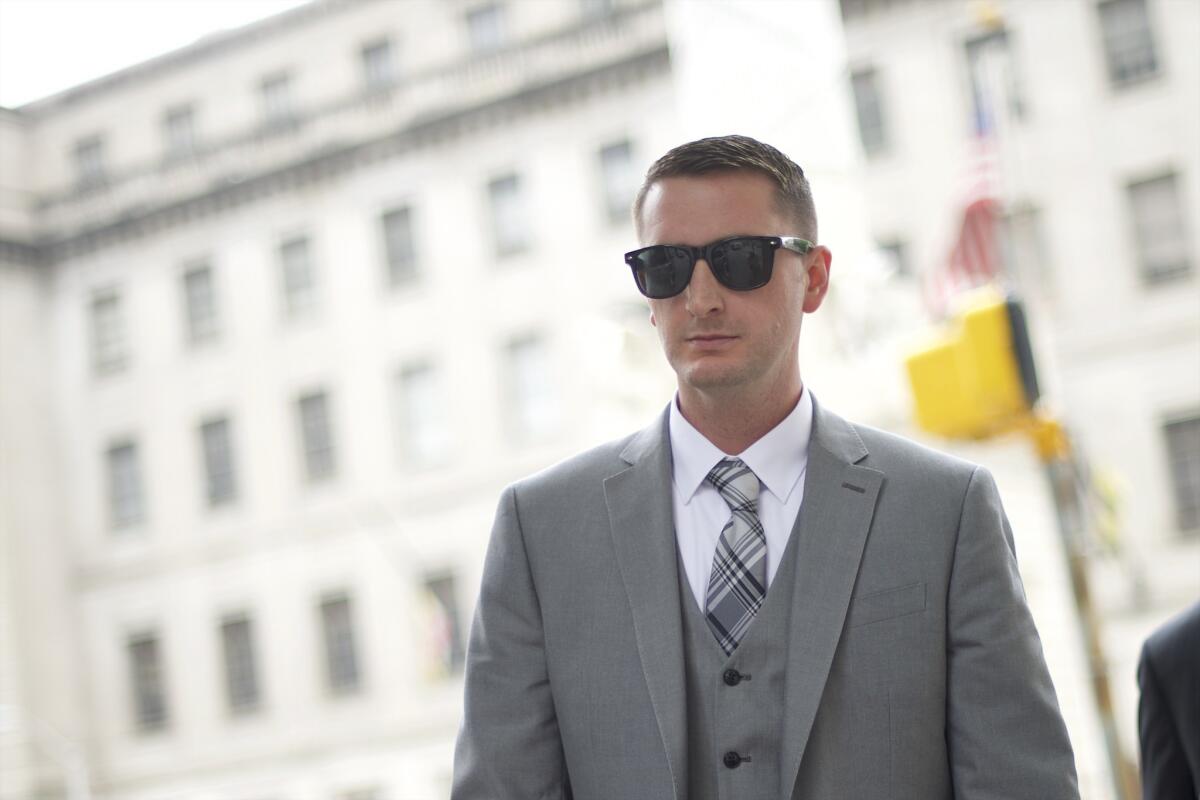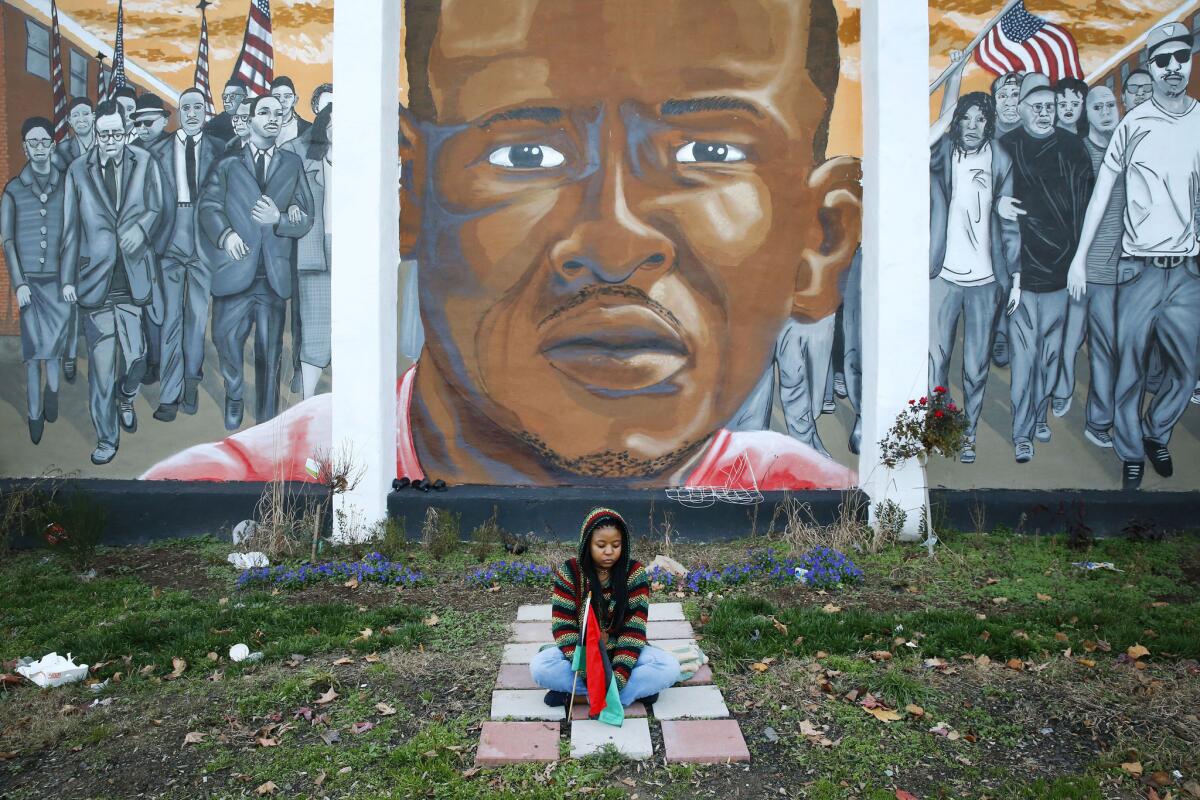Closing arguments today in Freddie Gray trial; judge promises verdict on Monday

- Share via
Reporting from Baltimore — Closing arguments are scheduled Thursday in the trial of a Baltimore police officer facing criminal charges related to the arrest of Freddie Gray, the 25-year-old Baltimore man who died last year after suffering a severe spinal cord injury while in police custody.
The trial ended Wednesday as Officer Edward Nero chose not to take the witness stand and Circuit Judge Barry Williams said he planned to deliver a verdict on Monday.
Nero was one of three bicycle officers who pursued Gray through a housing project in West Baltimore on April 12, 2015.
Prosecutors are alleging that Gray’s arrest in itself was an assault because it did not meet the standards of a legal detention. Legal analysts have called it an unusual theory.
Nero is also accused of endangering Gray by failing to secure him in the back of a police van with a seat belt.
The 30-year-old officer has pleaded not guilty to misdemeanor charges of second-degree assault, reckless endangerment and two counts of misconduct in office.
The defense has sought to minimize Nero’s role in the arrest, but has also argued that the officer was acting according to how he was trained and that any deviations he made were reasonable.

Officer Garrett Miller, who also faces charges in Gray’s arrest, was ordered to testify last week under immunity. Called as a prosecution witness, he said he alone caught, handcuffed and moved Gray.
Prosecutors say Miller and Nero described the arrest in their initial statements to investigators last April as a collective action.
“Their plan was to … arrest him, and then decide whether to un-arrest him,” Chief Deputy State’s Attorney Michael Schatzow said in his opening statement.
Much of the trial has revolved around the complexities of the so-called Terry stop, in which officers may detain someone briefly if they have reasonable suspicion that the person has been involved in a crime, and the steps officers must take to justify such a detention.
Legal analysts say mistakes or violations in such stops can bring administrative sanctions for officers or suppression of evidence, but have never before brought criminal charges.
“The simple detaining of somebody, seconds longer than hindsight would suggest is reasonable, is totally unreasonable to prosecute,” said Warren Alperstein, a Baltimore defense attorney who has been observing the proceedings.
But University of Maryland law professor Douglas Colbert sees an argument for the charges.
If a detention is unjustified, he said, “it makes sense to me that criminal charges would follow.
“It’s just a practice that hasn’t happened.”
During more than four days of testimony, there was no mention of the knife Gray was charged with carrying.
When Baltimore State’s Attorney Marilyn Mosby charged Nero, Miller and four other officers last year, prosecutors said the knife was legal, making Gray’s arrest unlawful.
Defense attorneys said the knife was illegal under city code. Prosecutors changed their argument, saying Gray was wrongfully detained before the knife was found.
At one point during the trial, Nero’s defense attorney Marc Zayon asked Miller if he found anything while searching Gray, and the judge cut off the question. A lengthy bench conference followed.
The version of Nero’s statement to investigators that was admitted into evidence appeared to have references to the knife removed.
University of Baltimore law professor David Jaros said he was surprised that the knife was not mentioned. He said the weapon was “critically important” to understanding the scope of how officers went about the arrest.
Colbert said the lack of discussion leaves unanswered the question of why Gray was arrested.
The prosecution did not call Officer William Porter to testify. Nero’s trial was scheduled to occur earlier in the year, but was delayed after prosecutors said they wanted to compel Porter — whose trial in Gray’s arrest and death ended in a mistrial — to testify in the case.
See the most-read stories this hour >>
Williams denied their request, saying it appeared to be “subterfuge” to achieve a delay. The prosecutors’ appeal reached the state’s highest court, which affirmed in March that Porter could be called.
But Porter wasn’t called, and Zayon asked Williams on Wednesday to dismiss the indictment, alleging prosecutorial misconduct.
Schatzow rejected the claim, saying rulings by Williams changed the case prosecutors intended to present and removed the need to call Porter. Williams agreed and denied the request.
Earlier in the proceedings, the defense called Capt. Justin Reynolds, a former director of training for the Baltimore Police Department, to testify as an expert on police procedures.
Police Department rules since 1999 have called on officers to secure arrestees with seat belts. Days before Gray’s arrest, the department mandated it.
But Reynolds testified that there was “no possible way” to put a seat belt on a detainee in the back of a police van without compromising an officer’s safety. He said the vans have “spaghetti-like” straps that require two hands to fasten, which leaves the officer unable to keep the arrestee at bay.
Deputy Chief State’s Attorney Janice Bledsoe asked Reynolds if he had ever seen anybody secured by a seat belt in a van. He said he had.
“So you know it’s possible to seat-belt someone in a wagon?” she asked. “It’s fair to say if a prisoner is being cooperative, and is seated on a bench, the expectation … is that the person should be seat-belted?”
“Yes ma’am,” Reynolds said.
Bledsoe asked if it was appropriate to take an arrestee to the ground if he is being cooperative and there’s no reason to believe he is armed.
“Under those circumstances, no,” he said.
ALSO
Amazon CEO calls Trump’s behavior not ‘appropriate’ for a presidential candidate
Education and healthcare are ripe for start-ups, AOL co-founder says
Impact of the U.S.-Mexico border fence on wetlands is mixed
More to Read
Sign up for Essential California
The most important California stories and recommendations in your inbox every morning.
You may occasionally receive promotional content from the Los Angeles Times.












